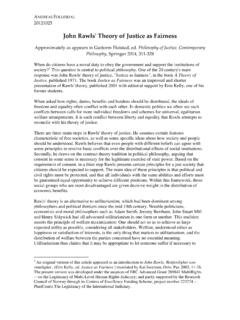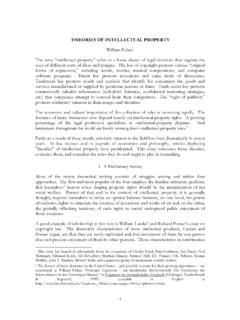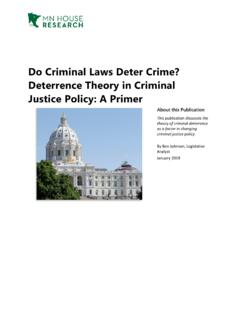Transcription of Criminal Justice Theory: Toward Legitimacy and an ...
1 Justice QUARTERLY VOLUME 23 NUMBER 2 (JUNE 2006)ISSN 0741-8825 print/1745-9109 online/06/020167-19 2006 Academy of Criminal Justice SciencesDOI: Justice theory : Toward Legitimacy and an InfrastructurePeter B. KraskaTaylor and Francis quarterly0741-8825 (print)/1745-9109 (online)Original Article2006 Taylor & Criminal Justice /Criminology, theory is generally assumed to beconcerned with crime and crime rates. Studying Criminal Justice is tacitly, andsometimes explicitly, relegated to the narrow role of evaluative and descriptivescholarship. This article explores the reasons for our field s failure to recognizethe importance of developing an accessible and well-recognized theoreticalinfrastructure not about crime, but Criminal Justice and crime control phenom-ena.
2 It examines the complexity of our object of study when theorizing criminaljustice and the efficacy of organizing Criminal Justice theory using multiple theoretical orientations. The conclusion stresses the essentiality of criminaljustice theory , with particular emphasis on academic credibility, qualityresearch, informed practices, and sound Justice theory ; academic Legitimacy ; criminological theoryCriminal Justice is an academic discipline in practice but not yet in theory .(Marenin & Worrall 1998)Introduction: A Serious Disciplinary DeficiencyTheory lies at the heart of any social science discipline (Bernstein, 1976;Flyvbjerg, 2001; Garland, 1990).
3 It defines the parameters for how we thinkabout our objects of study, and provides us the lenses through which we filterour subject matter in order to make sense of complex phenomena. It gives usour organizing concepts, frames our research questions, guides our scholarlyPeter Kraska is Professor of Criminal Justice and Police Studies at Eastern Kentucky University. Hisrecent research interests include the nature and importance of real-world theory as examinedthrough the government s response to the Hurricane Katrina disaster, the trend to criminalize riskyand negligent behaviors as an adaptation to late-modern social conditions, and a continuation ofstudy into the blurring distinction between the police and military in the wars on drugs and to: Peter Kraska, Department of Criminal Justice and Police Studies, EasternKentucky University, Richmond, Kentucky 40475, USA.
4 E-mail: KRASKA interpretations, and is an unavoidable presence in crime control policy, prac-tice, and decision-making. Criminal Justice /criminology does not have a recog-nized and readily accessible theoretical infrastructure about the criminaljustice system and crime control a serious disciplinary deficiency voiced bynumerous leading scholars (Bernard & Engel, 2001; Clear, 2001; Crank, 2003;Cullen, 1995; Duffee, 1980, 1990; Hagan, 1989; Marenin & Worrall, 1998; Sulli-van, 1994; Zalman, 1981).A Criminal Justice theoretical infrastructure would involve a well-organizedand usable collection of explanatory frameworks targeted at making theoreticalsense of Criminal Justice and crime control phenomena.
5 Criminal Justice would be a multi-faceted object of theorizing and, as discussed in detail later,would range from explaining individual practitioner decision-making to theexponential growth in power and size of the Criminal Justice apparatus over thelast 30 article s overall objective is to start the process of re-orienting ourdiscipline to approach the study of Criminal Justice /crime control as a legiti-mate and essential object of theorizing in and of itself; a second dependentvariable for our field alongside crime and crime rates. While still acknowledg-ing their interconnections, crime and Criminal Justice would be treated as dualobjects of study as opposed to approaching Criminal Justice phenomena as themere outcome or effect of accomplish this end, this article first exposes the default assumption thattheory-work in our field refers generally to crime theory .
6 Second, it decon-structs the related assumption that Criminal Justice studies is an a-theoreticalpursuit merely fulfilling our field s how to and what works , it outlines the highly complex and multi-faceted nature of criminaljustice as an object of theorizing. The fourth section examines the largevolume of literature, found in a number of sub-areas of study, which could becredibly re-conceptualized as Criminal Justice theory . Finally, it presents aworkable model for constructing a theoretical infrastructure, relying on theidentification and categorization of major theoretical orientations alreadypresent in our discipline, as opposed to pursuing a single, testable criminaljustice theory .
7 It concludes by discussing the benefits of normalizing criminaljustice theory in crime and Justice studies, for our research and scholarship, Criminal Justice and crime control practices, and as an integral part of Crime theory DefaultThere can be no doubt that our field of study has a clearly defined, albeit highlycontested, theoretical project. Countless journal articles and books have for atleast the last 70 years constructed, tested, debated, and organized theory . Theproblem lies not in the amount and quality of work but, rather, in the object Justice theory 169 Our discipline, with some important exceptions reviewed later, assumes bydefault that theory -work is reserved for the why of crime and crime our leading scholarly journals, theory development and testing istargeted primarily at explaining crime (Bernard & Engel, 2001; Cullen, 1995;Hagan, 1989; Henderson & Boostrom, 1989).
8 Our theory textbooks focusalmost exclusively on the why of deviance, crime, and delinquency (Henderson& Boostrom, 1989). Even the majority of our Introduction to Criminal Justice textbooks, which have the Criminal Justice system as their explicit object ofstudy, dedicate nearly all their discussion of theory to theories of criminalbehavior. Our undergraduate and graduate degree programs, even within crimi-nal Justice departments, assume that the theory component of their curriculumshould concentrate almost exclusively on the why of crime. Teaching theory , as part of a criminology/ Criminal Justice curriculum, refers almost universally toteaching crime theory (Henderson & Boostrom, 1989).
9 Overall, it is taken-for-granted that our central object of theorizing in crimeand Justice studies is crime. Pursuing a recognized and usable theoreticalinfrastructure about Criminal Justice despite the frustration for this stateaffairs voiced by leading scholars in the field over the last three decades hasnot been an acknowledged priority and certainly does not constitute a recog-nized theoretical project (Bernard & Engel, 2001; Crank, 2003; Cullen, 1995;Duffee, 1980, 1990; Hagan, 1989; Henderson & Boostrom, 1989; Marenin &Worrall, 1998; Zalman, 1981).Why Not Criminal Justice theory ? Criminal Justice Studies: An A-Theoretical EndeavorThe tradition that assumes crime theories suffice as a theoretical foundation forstudying Criminal Justice has been perhaps the central barrier for the develop-ment of a theoretical infrastructure.
10 One tactic has been to employ theories ofcrime in developing models of Criminal Justice functioning. Einstadter and Henry(1995) demonstrate clearly how Criminal Justice functioning interrelates with ourconceptions of why crime occurs. And while this use of crime theory certainlysheds considerable light on our understanding of Criminal Justice functioning,even these authors concede that it does not constitute the development of theo-ries of Criminal Justice : Our concern here is not theories of social control per se,but the models of Criminal Justice that are implied by and that are logically consis-tent with particular theories of crime causation (Einstadter & Henry, 1995:3).





